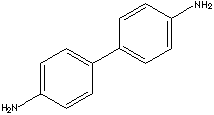| BENZIDINE | ||
|
PRODUCT IDENTIFICATION |
||
| CAS NO. | 92-87-5 |
|
| EINECS NO. | 202-199-1 | |
| FORMULA | NH2C6H4C6H4NH2 | |
| MOL WT. | 184.24 | |
|
H.S. CODE |
||
| TOXICITY | ||
| SYNONYMS | p-Diaminodiphenyl; Bensidine; Benzydyna; | |
| 1,1'-Biphenyl-4,4'-Diamine; 4,4'-diamino-1,1'-biphenyl; 4,4'-Diaminobiphenyl; 4,4'-Bianiline; 4,4'-Biphenyldiamine; 4,4'-Diphenylenediamine; p-benzidine; Benzidine base; C.I. 37225; C.I. Azoic Diazo Component 112; | ||
| SMILES | nitrobenzene reduction to hydrazobenzene in alkaline medium | |
|
CLASSIFICATION |
|
|
|
PHYSICAL AND CHEMICAL PROPERTIES |
||
| PHYSICAL STATE | white to slightly reddish crystalline powder | |
| MELTING POINT | 128 C | |
| BOILING POINT | 401 - 402 C | |
| SPECIFIC GRAVITY | 1.25 | |
| SOLUBILITY IN WATER | Sparingly soluble | |
| pH | ||
| VAPOR DENSITY | 5.81 | |
|
AUTOIGNITION |
|
|
|
NFPA RATINGS |
Health: 1; Flammability: 1; Reactivity: 0 | |
|
REFRACTIVE INDEX |
||
| FLASH POINT | 77 C | |
| STABILITY | stable under ordinary conditions | |
|
GENERAL DESCRIPTION AND APPLICATIONS |
||
| Benzidine is an arylamine compound with the structure of biphenyl having two amine groups at para position each. It is a white to slightly reddish crystalline powder turns dark on exposure to air and light; melting point of 128 C. This compound decomposes on heating and reacts violently with strong oxidants, particularly nitric acid. It is produced by the action of acids on hydrazobenzene. Benzidne forms a blue precipitate with hemoglobin. It was used in testing for occult blood, its use is now limited because of cancer suspect. It is important in azo dye production due to strong fix to cotton. It and its derivatives have active applications in the synthesis of dyes, pigments, paints, rubber compounding agents and wide range of organic chemicals. | ||
| SALES SPECIFICATION | ||
|
APPEARANCE |
white to slightly reddish crystalline powder | |
|
ASSAY |
95.0% min |
|
|
TRANSPORTATION |
||
| PACKING | ||
| HAZARD CLASS | 6.1 (Packing Group II) | |
| UN NO. | 1885 | |
| OTHER INFORMATION | ||
| Hazard Symbols: T, Risk Phrases: 45-22-50/53, Safety Phrases: 53-45-60-61 | ||
